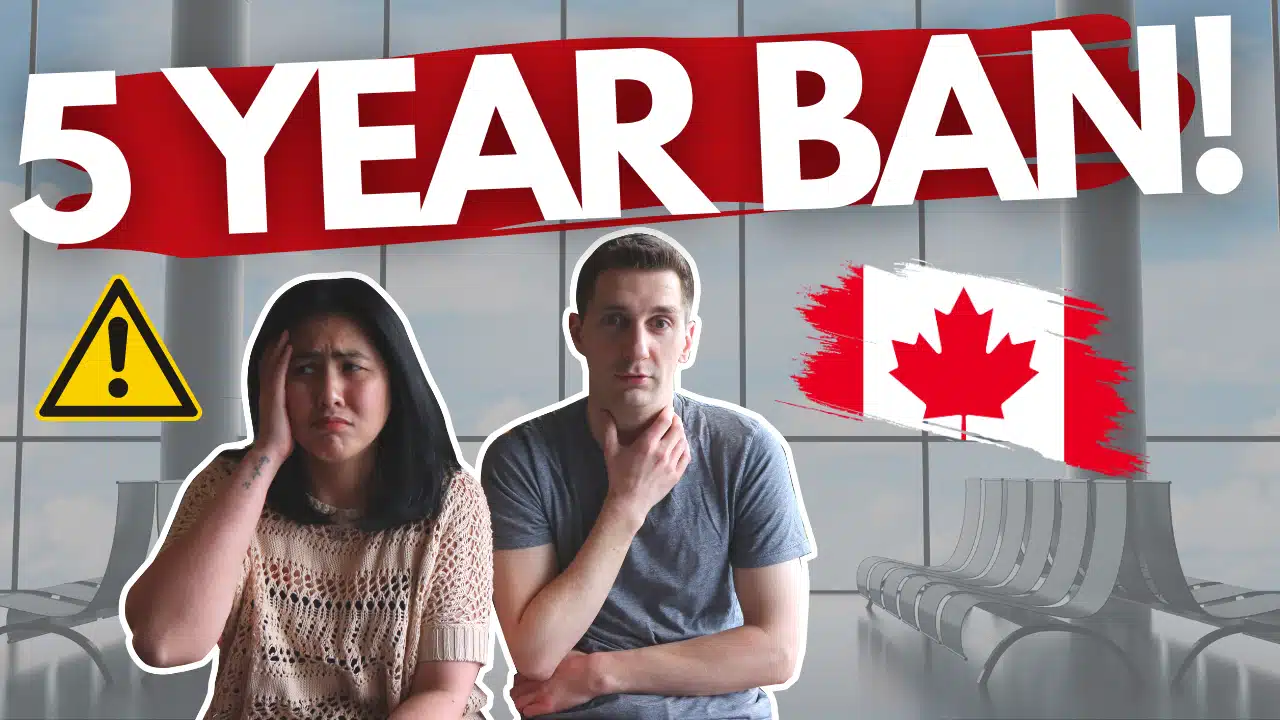Receiving a 5-year ban from Canada can be a major hurdle, typically resulting from misrepresentation during the immigration process. Although such a ban is serious, there have been instances where individuals have successfully had it lifted, allowing them to reapply for a visa. The key to overcoming this ban lies in comprehending the underlying reasons and exploring the available solutions. This article provides insight into navigating and potentially overcoming a 5-year ban from Canada.
Understanding Misrepresentation in Canadian Immigration
Misrepresentation in the context of Canadian immigration entails providing false information or omitting crucial details during the application process. Common examples include:
- Inaccurate Information: Falsifying personal details such as age, marital status, education, or work experience.
- Document Forgery: Submitting counterfeit, altered, or manipulated documents.
- Omission of Critical Facts: Failing to disclose essential information, such as previous visa rejections or criminal records.
The repercussions of misrepresentation can be severe, including a 5-year ban from entering Canada, rejection of current applications, and potential deportation if already present in the country.
Strategies to Overcome a Canada 5-Year Ban
1. Temporary Resident Permit (TRP)
One viable approach to address a 5-year ban is to apply for a Temporary Resident Permit (TRP). TRPs are granted to individuals who are otherwise inadmissible but have compelling reasons to enter Canada temporarily.
Application Procedure:
- Submission: Submit your application at a Canadian visa office outside Canada or at the port of entry.
- Documentation: Provide a detailed explanation of the compelling reasons for your visit, along with supporting documents such as medical records, letters of invitation, and proof of relationships.
Evaluation:
- Risk-Benefit Analysis: Immigration officers will assess the risks of allowing your entry against the potential benefits. This assessment will consider the reasons behind your initial ban.
- Duration: TRPs are issued for a specified period and may need renewal if you require an extended stay. Ensure that you include all return tickets and plans to leave the country.

2. Authorization to Return to Canada (ARC)
If you have been deported and are subject to a 5-year ban, you can apply for an Authorization to Return to Canada (ARC) if you need to return before the ban expires.
Application Process:
- Detailed Application: Explain your reasons for wanting to return, such as family reunification, job opportunities, or humanitarian grounds.
- Supporting Evidence: Provide documentation supporting your reasons, such as job offers, letters from family in Canada, and evidence of hardships. Clearly state the reason for your previous ban and whether it was intentional or accidental.
Decision:
- Officer’s Discretion: The decision to grant an ARC is at the discretion of the immigration officer, who will consider the reasons for your deportation and your request to return.
3. Humanitarian and Compassionate (H&C) Grounds
Humanitarian and Compassionate (H&C) applications are for individuals who would suffer unusual, undeserved, or disproportionate hardship if not allowed to stay in or enter Canada.
Considerations:
- Family connections
- Long-term establishment in Canada
- Best interests of any involved children
- Significant hardships or reasons to enter Canada
Application:
- Comprehensive Submission: Provide a thorough explanation of your circumstances, along with supporting documents demonstrating your ties to Canada and potential hardships if not allowed entry.
Review:
- Officer Assessment: Officers will review all aspects of your case, including personal circumstances, family ties, and other hardships.
4. Legal Advice and Representation
Consulting an immigration lawyer or licensed immigration consultant can provide valuable guidance and increase the likelihood of a successful application.
Expertise:
- These professionals are well-versed in immigration laws and procedures and can offer personalized advice.
Preparation of Case:
- Document Compilation: Help gather and organize the necessary documentation.
- Application Drafting: Assist in writing persuasive arguments and ensuring that all forms are correctly filled out.
- 4. Legal Advice and Representation
- Seeking the counsel of an immigration lawyer or licensed immigration consultant can greatly improve the chances of a successful application.
- Expertise:
- These professionals are well-versed in immigration laws and can offer tailored advice.
- Case Preparation:
- Document Gathering: Assist in compiling and organizing necessary documentation.
- Application Drafting: Help write persuasive arguments and ensure all forms are accurately completed.
- Representation: Act on your behalf in communications with immigration authorities and during legal proceedings.
- Representation: Represent you in communications with immigration authorities and during any legal proceedings.
5. Waiting Out the Ban
If you cannot provide strong evidence that misrepresentation was due to someone else’s fault, you might have to wait out the ban. Avoid attempting to re-enter Canada illegally during this period, as it can lead to additional penalties.
Post-Ban Reapplication:
- New Application: After the ban period ends, reapply for a visa or permanent residence. Ensure you meet all eligibility criteria and have no further violations.
- Compliance Demonstration: Show that you adhered to all immigration rules during the ban period.

Post-Ban Reapplication:
- New Application: Once the ban period has expired, apply for a visa or permanent residence. Ensure that you meet all eligibility criteria and have no further violations.
- Demonstrate Compliance: Show that you have complied with all immigration rules during the ban period.
6. Appeals and Reviews
If you believe the deportation or ban was unjust, you may be able to appeal the decision or request a judicial review.
Deportation Appeal:
- Timing: If recently deported, you may appeal the deportation order or request a judicial review within a specific timeframe.
- Appeal Grounds: Argue that the deportation was unjust or that procedural errors occurred.
Legal Routes:
- Federal Court: Apply to the Federal Court of Canada for a judicial review of the deportation decision.
- Process: An immigration lawyer can help prepare and present your case in court, challenging the decision on legal grounds.
Canada may show leniency in certain cases of misrepresentation, particularly when the individual can prove that the mistake was not their fault or was unintentional. If you believe a 5-year ban was unjust, exploring the outlined strategies can help lift the ban and allow re-entry with a new visa. Professional legal advice is often crucial in navigating these complex procedures effectively.
Share Your Thoughts
- Comment: Share your experiences or questions about overcoming a 5-year ban from Canada.
- Subscribe: Receive the latest immigration news and updates directly to your inbox.




